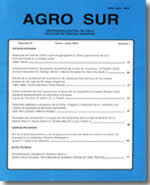Socioeconomic and productive characterization of a group of farmers from Chiloé, registered to PABCO certified farmers
Main Article Content
Abstract
Milk and meat production is well developed in the central and the southern zones of the country, with the milk production being concentrated between the Region de los Rios and the Region de Los Lagos; whereas meat production extends from the Maule Region to the Magallanes Region.
The recently signed Free Trade Agreements (FTA’s) have increased the trading opportunities for the cattle sector. It is necessary to characterize small producers to provide future support to improve their efficiency and to better face the new trading conditions.
The objective of this study was to conduct a social, economic and productive characterization of a group of farmers from the Community of Ancud in the Province of Chiloé, and during the implementation and certification as bovine PABCO farms.
Data was collected using a static structured survey given to 31 farmers belonging to the Instituto National de Desarrollo Agropecuario (INDAP) (National Institute of Agriculture Development) programme with bovine PABCO farm certification, and analyzed using descriptive statistics.
Bovine PABCO farm certification is a program created to ensure that a series of management strategies are carried out at the farm level, to certify that the meat sent abroad of high quality and innocuous for human consumption and to ensure traceability of the animals. It is a program available for all farmers.
Most of the farmers are men and less than half of them have completed primary schooling and less than 10% have finished secondary schooling.
All of the farmers are solely farming cattle, mainly for milk production with bovine meat production as a secondary target. Potato production (Solanum tuberosum L), is mainly for self-consumption.
Their motivation to become PABCO certified farms is to improve their trading opportunities and income.

